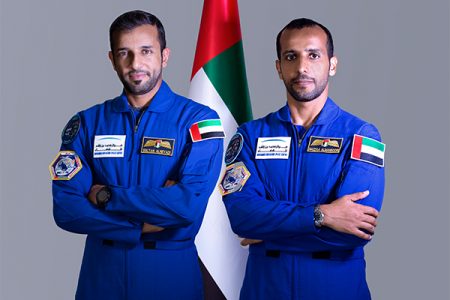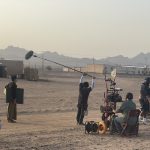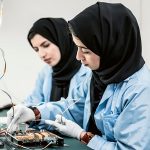Under the new partnership, Emirati astronauts Hazzaa AlMansoori and Sultan AlNeyadi will undergo specialised training at the Johnson Space Center in Houston.

The Mohammed Bin Rashid Space Centre (MBRSC) and NASA have signed a strategic agreement to train Emirati astronauts at the US space agency. This partnership aims to prepare Emirati astronauts for advanced space missions by providing them with the highest level of expertise and knowledge.
Under the agreement, four Emirati astronauts will be provided advanced training. Emirati astronauts Hazzaa AlMansoori and Sultan AlNeyadi are currently taking part in the training as part of the strategic partnership between the two organisations.
Two astronauts will be selected from the second batch of the UAE Astronaut Programme who will join the 2021 NASA astronaut candidate class. The training programme will be conducted at NASA’s Johnson Space Center.
The programme created as part of the new partnership includes the same modules and components featured in the training of NASA astronauts. Under the programme, the astronauts will be trained to manage various missions on the International Space Station, including simulated spacewalks and long-duration stay, along with training in major systems, robotics, extravehicular activity, T-38 jet courses, water and land survival, Russian language skills and theoretical training.
Hazzaa AlMansoori and Sultan AlNeyadi had earlier trained at the Yuri Gagarin Cosmonaut Training Center in Star City, Moscow in September 2018 as part of their preparation for the launch to the ISS.
Commenting on the agreement, HE Hamad Obaid Al Mansoori, Chairman, MBRSC, said: The global space sector is based on international cooperation fostered by establishing alliances and building bridges of knowledge with leading international space organisations and agencies. The strategic partnership with NASA, a space pioneer for more than 60 years, supports the strategy of the UAEs National Space Programme. Emirati astronauts will benefit from NASAs extensive infrastructure, experience and knowledge in spaceflight development and operations.”
HE Al Mansoori added: This agreement is a clear testament of the strong economic, cultural and diplomatic ties between the UAE and the USA. The UAE space sector today has advanced expertise that must be enhanced and utilised for future space missions. These accomplishments have raised the global profile of the UAE space sector and enhanced the capabilities of Emirati astronauts.”
HE Yousuf Hamad Al Shaibani, Director General, MBRSC, noted: “This agreement supports the objectives of the Mohammed bin Rashid Space Centre to promote the Emirates Astronaut Program and global partnerships for the country in the area of manned spaceflight. This is being achieved through investments in specialised space training and other projects related to scientific research and the development of space technologies. These initiatives pave the way for future strategic partnerships that can support the growth of the UAEs space sector.
James W Morhard, Deputy Administrator, NASA remarked: The USA and the UAE enjoy a strong relationship in the space sector, and we are excited to extend that relationship with this agreement. The UAE has made extraordinary progress in the space arena in a short amount of time with the successful launch of the Hope Mars probe, the regions first interplanetary spacecraft, the latest example of the countrys ambitious space programme. This agreement to train Emirati astronauts will pave the way for even closer relations between our two nations creating new opportunities for the UAE to become involved in the International Space Station, Artemis, and other NASA activities.
Salem AlMarri, Head of the UAE Astronaut Programme, MBRSC, added: This agreement supports the strategic objectives of the UAE Astronaut Program to enhance the position of the UAE’s space sector and contribute, together with counterparts from all across the world, to space research. This initiative represents a quantum leap for the UAE Astronaut Program, which is one of the main pillars for developing scientific cadres and creating future generations of pioneers, in accordance with the highest international standards. It also contributes to realising the nations aspirations for promoting scientific exploration in this field.















































































